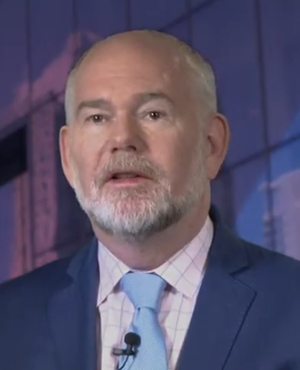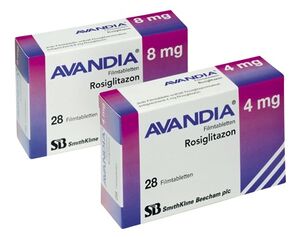John Buse
(doctor, whistleblower) | |
|---|---|
 | |
| Nationality | US |
| Alma mater | Dartmouth College, Duke University, University of Chicago |
| Interests | • GlaxoSmithKline • Avandia • diabetes • Tadataka Yamada |
When he warned of risks with GlaxoSmithKline diabetes drug Avandia, the company forced him to retract by threatening to destroy his academic career and a huge lawsuit for loss in stock value. | |
Professor John B. Buse, MD, PhD, is Chief of the Division of Endocrinology, Director of the Diabetes Center, Director of the North Carolina Translational and Clinical Sciences Institute and Executive Associate Dean for Clinical Research at the University of North Carolina (UNC) School of Medicine in Chapel Hill.
When he in 1999 suggested that the newly marketed diabetes medicine Avandia sold by GlaxoSmithKline (GSK) may carry cardiovascular risks, the company responded with an orchestrated plan to stifle his opinion,[1] by contacting his boss, accusing him of lying, and threatening to sue him for a $4 billion drop in the company’s stock valuation[2]. In the end, the company forced him to sign a "retraction letter".
Threatened by GlaxoSmithKline
In 1999, Dr. Buse found that Avandia users had a high risk of heart disease, and published his findings. The company soon started a counteroffensive.
Internal documents revealed by a 2007 Senate Finance Committee report[1] showed that a GSK official emailed Tadataka Yamada, then the GSK’s chairman of research and development (Yamada later became President of the Global Health Program at the Bill & Melinda Gates Foundation), urging him to write a “firm letter” to Buse.
It would contain a warning that “the punishment will be that we will complain up his academic line and to the CME [continuing medical education] granting bodies that accredit his activities.”[3]
Yamada wrote back, “I think there are two courses of action. One is to sue him for knowingly defaming our product even after we have set him straight as to the facts—the other is to launch a well-planned offensive on behalf of Avandia.”[4] The Senate report also confirmed that Dr Yamada telephoned the chairman of Dr Buse's department, Fred Sparling.[1]
The plans to silence Dr. Buse involved discussions by executives at the highest levels of GSK, including David Stout, a senior GSK executivem and CEO Jean-Pierre Garnier. GSK prepared and required Dr. Buse to sign a letter claiming that he was no longer worried about cardiovascular risks associated with Avandia. After Dr. Buse signed the letter after pressure from his superior, GSK officials began referring to it as Dr. Buse’s “retraction letter.”[1]
Avandia still for sale
The drug Rosiglitazone (trade name Avandia) was patented in 1987 and approved for medical use in 1999.
In 2007, a meta-analysis of 42 randomized controlled trials[5] of the drug confirmed Buse’s findings and revealed that there was a 43 percent increase in the risk of heart disease among diabetics taking Avandia.
Adverse effects alleged to be caused by Avandia were the subject of over 13,000 lawsuits against GSK;[6] as of July 2010, GSK had agreed to settlements on more than 11,500 of these suits.
By 2013, as many as 100,000 heart attacks, strokes, deaths and cases of heart failure may be directly attributed to Avandia since the drug was launched in 1999, according to FDA scientist Dr. David Graham[7]. In 2010 regulators stop Avandia sales in Europe because of the increased heart risks. In the US, physicians are still prescribing the drug to nearly half a million people, which translates into approximately $900 million in annual sales for GSK. [8][9]
Dr. Buse completed service as President for Medicine & Science at the American Diabetes Association in 2008 and as Chair of the National Diabetes Education Program in 2014.
References
- ↑ a b c d https://www.finance.senate.gov/imo/media/doc/prb111507a.pdf
- ↑ https://www.ncbi.nlm.nih.gov/pmc/articles/PMC1892463/
- ↑ https://www.ucsusa.org/resources/glaxosmithkline-tried-silence-scientist-who-exposed-dangers-its-drug-avandia
- ↑ https://www.ncbi.nlm.nih.gov/pmc/articles/PMC2099503/
- ↑ http://www.nejm.org/doi/full/10.1056/NEJMoa072761
- ↑ https://www.bloomberg.com/news/2010-07-09/glaxo-withheld-avandia-study-former-fda-manager-said-to-testify-in-suit.html
- ↑ https://ethicalnag.org/2013/01/21/avandia-a-very-short-history-of-a-very-bad-drug/
- ↑ https://www.bloomberg.com/news/2013-11-25/glaxo-s-avandia-cleared-from-sales-restrictions-by-fda.html
- ↑ https://www.fda.gov/NewsEvents/Newsroom/PressAnnouncements/ucm376516.htm
